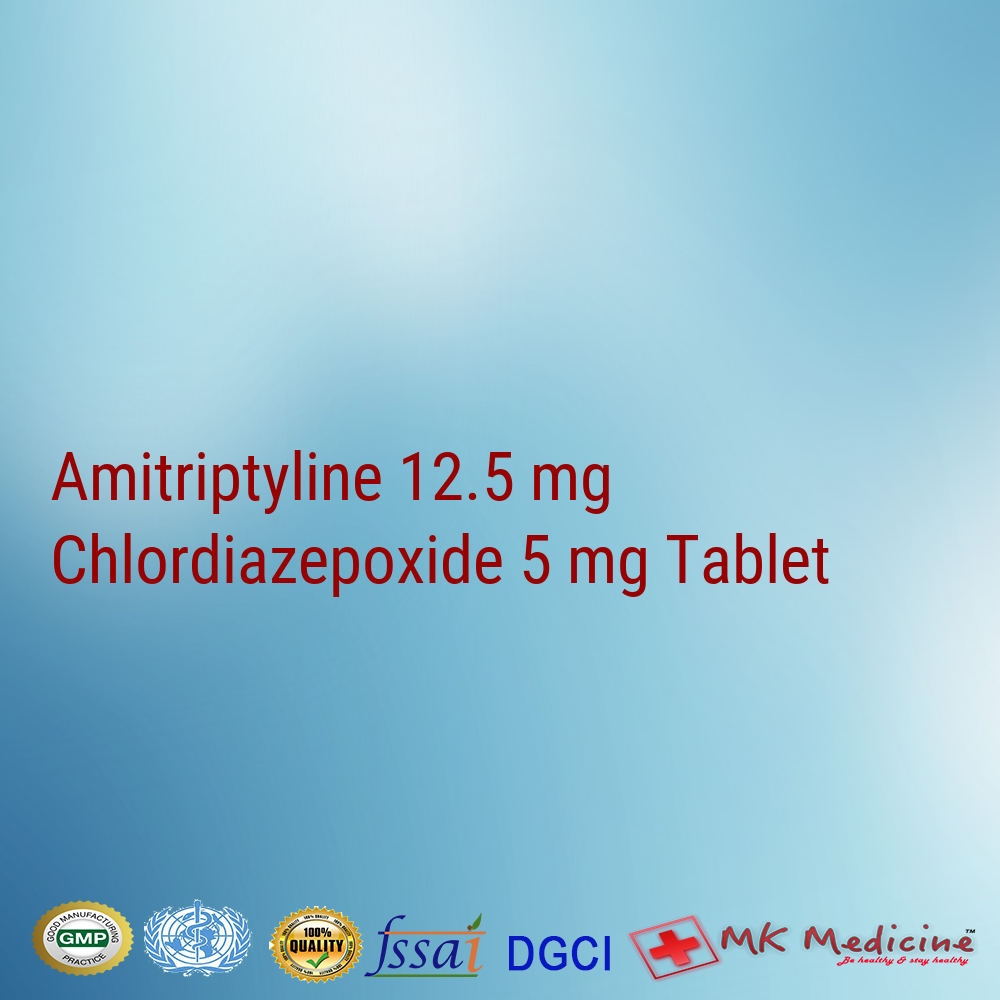Chlordiazepoxide/amitriptyline is used to treat people who have both depression and anxiety at the same time.
Chlordiazepoxide belongs to a class of drugs called benzodiazepines. Amitriptyline belongs to a class of drugs called tricyclic antidepressants. A class of drugs is a group of medications that work in a similar way. These drugs are often used to treat similar conditions.
Chlordiazepoxide/amitriptyline works on your central nervous system. It increases the level of certain chemicals in your brain. This improves your symptoms of depression and anxiety.
MK Medicine is a leading pcd franchise provider, contract manufacturer and hospital supplier of WHO-GMP certified Amitriptyline 12.5 mg Chlordiazepoxide 5 mg Tablet
Don’t take these drugs with chlordiazepoxide/amitriptyline. Doing so can cause dangerous effects in the body. Examples of these drugs include:
- Phenelzine, tranylcypromine, and selegiline. Taking these drugs together may lead to convulsions (violent, involuntary movements) and a dangerously high fever. It may even be fatal (cause death).
- Flecainide and propafenone. Taking these drugs together could increase your risk of irregular heart rate.
- Sertraline, fluoxetine, and paroxetine. Taking these drugs together can increase the side effects of chlordiazepoxide/amitriptyline. These can include dizziness, confusion, and heart attack.
- Cimetidine and quinidine. These drugs could increase the amount of the amitriptyline in your body. This could lead to dangerous side effects. These can include dizziness, confusion, and heart attack.
The more common side effects of chlordiazepoxide/amitriptyline can include:
-
drowsiness
-
dry mouth
-
constipation
-
blurred vision
-
dizziness
-
bloating
-
vivid dreams
-
tremors (uncontrollable rhythmic movements in one part of your body)
-
erectile dysfunction (trouble getting or keeping an erection)
-
confusion
- Phenelzine, tranylcypromine, and selegiline. Taking these drugs together may lead to convulsions (violent, involuntary movements) and a dangerously high fever. It may even be fatal (cause death).
- Flecainide and propafenone. Taking these drugs together could increase your risk of irregular heart rate.
- Sertraline, fluoxetine, and paroxetine. Taking these drugs together can increase the side effects of chlordiazepoxide/amitriptyline. These can include dizziness, confusion, and heart attack.
- Cimetidine and quinidine. These drugs could increase the amount of the amitriptyline in your body. This could lead to dangerous side effects. These can include dizziness, confusion, and heart attack.
This drug could cause heart problems. These include irregular heart rate, heart attack, and stroke. You shouldn’t take chlordiazepoxide/amitriptyline if you’ve had a recent heart attack.
This drug shouldn’t be used to treat bipolar disorder. Taking antidepressants, such as chlordiazepoxide/amitriptyline, can cause people with bipolar to switch from depression to a manic phase. You should use other drugs called mood stabilizers instead of antidepressants.
This drug may increase your risk of seizures.
This drug may make your condition worse.
Thyroid drugs may increase the side effects of chlordiazepoxide/amitriptyline.
Amitriptyline is a category C pregnancy drug. That means two things:
- Research in animals has shown adverse effects to the fetus when the mother takes the drug.
- There haven’t been enough studies done in humans to be certain how the drug might affect the fetus.
Talk to your doctor if you’re pregnant or planning to become pregnant. This drug should only be used if the potential benefit justifies the potential risk to the fetus.
Chlordiazepoxide is a category D pregnancy drug. This means:
- Research in humans has shown adverse effects to the fetus when the mother takes the drug.
- This drug should only be used during pregnancy in serious cases where it‚s needed to treat a dangerous condition in the mother.
Talk to your doctor if you’re pregnant or planning to become pregnant. Ask your doctor to tell you about the specific harm that may be done to the fetus. This drug should be only used if the potential risk to the fetus is acceptable given the drug’s potential benefit.
Chlordiazepoxide/amitriptyline may pass into breast milk and may cause side effects in a child who is breast-fed.
Talk to your doctor if you breast-feed your child. You may need to decide whether to stop breast-feeding or stop taking this medication.
Important Notice:- The Database is still under development and may contain inaccuracies. It is not intended as a substitute for the expertise and judgement of your physician, pharmacist or other healthcare professional. It should not be construed to indicate that the use of any medication in any country is safe, appropriate or effective for you. Consult with your healthcare professional before taking any medication.


Gabapentin 300 mg Methylcobalamin 500 mcg Tablet